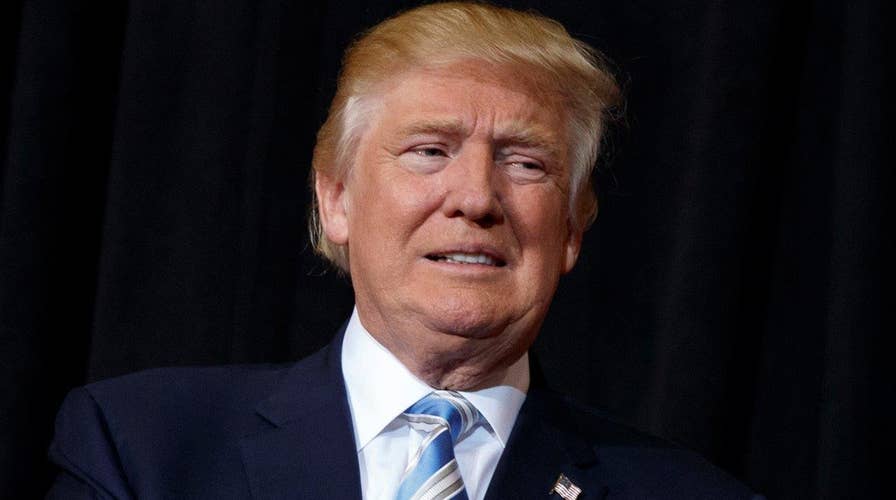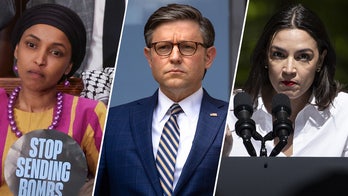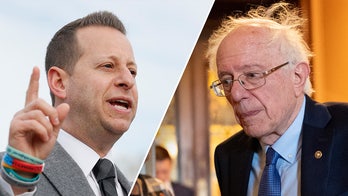Trump's Cabinet called a 'conservative dream team'
Rep. Collins says Republicans are 'giddy' on Capitol Hill
With 50 days left until his inauguration, President-elect Trump is ahead of the game.
Not only has he been able to make good on his campaign promise to keep some U.S. manufacturing jobs from leaving the United States, he’s also exceeded his predecessors in the number of candidates he’s nominated to his Cabinet.
While there was some early negative coverage of Trump’s transition scramble, in the three weeks since his victory over Democratic challenger Hillary Clinton, Trump has steadily rolled out a series of top staff hires and Cabinet picks, including Steven Mnuchin for treasury secretary, Elaine Chao for transportation secretary and Wilbur Ross for commerce secretary.
In all, he’s made eight Cabinet nominations in three weeks – outperforming all of his president-elect predecessors dating back to Richard Nixon. His closest competitor is former President George H.W. Bush, who announced four Cabinet picks three weeks after the election. President Obama came in third with one pick.
In all, there will be 4,000 political appointments made by the incoming Trump administration. Of those, about 1,200 will require Senate confirmation.
Soon after the election, Trump appointed Republican National Committee Chairman Reince Priebus to be White House chief of staff. Though Priebus isn’t an official Cabinet member, he is in a role that is considered Cabinet rank. The chief of staff is the highest-ranking official at the White House and typically has the ear of the president. Many analysts praised the move, saying Priebus, a Washington insider, could help Trump’s administration score early legislative victories.
As Trump drew some cheers picking Priebus, he was met with resistance after naming controversial former Breitbart News chairman Stephen Bannon as his chief strategist. Some Democrats demanded he rescind the choice. He has not.
While on the campaign trail, Trump often took shots at the Wall Street elite.
Though he promised to push back on Wall Street fat-cats, Trump has tapped Mnuchin, a former Goldman Sachs executive with no federal government experience to lead the Treasury Department. If confirmed by the Senate, Mnuchin will become Trump’s principal economic advisor. Already, Mnuchin has vowed to roll back parts of the 2010 Dodd-Frank financial regulation package.
Trump also nominated Wilbur Ross to lead the Commerce Department. Ross, whose net worth is estimated to be around $2.9 billion, heads up a private equity firm that specializes in bringing companies back from bankruptcy.
Trump has also picked Rep. Tom Price, an outspoken critic of ObamaCare, to head up the Department of Health and Human Services. If confirmed by the Senate, Price, an orthopedic surgeon from Georgia, will play a key role in fulfilling Trump’s campaign promise to dismantle ObamaCare.
Trump has also made some controversial picks, including South Carolina Gov. Nikki Haley as the next U.S. ambassador to the United Nations. Haley, a rising star in the Republican Party, initially endorsed Florida Sen. Marco Rubio in the GOP primaries. If she is confirmed by the Senate, she will represent the country’s interests at the Security Council on a number of issues including nuclear proliferation.Though Haley is a popular governor, she has relatively no foreign policy experience.
Another Trump pick that’s raised eyebrows is Betsy DeVos. The billionaire Republican donor and charter school advocate is a polarizing figure in the education industry. She’s never worked in public education nor has she sent her kids to public school. She’s also sent mixed signals on Common Core.
At an Ohio rally Thursday night, Trump announced he would nominate retired Marine Gen. James Mattis as secretary of defense.
Trump described Mattis as "one of our great, great generals" and added that a formal announcement would be made Monday, "so don't tell anybody."
"They say he's the closest thing to Gen. George Patton that we have," Trump told the crowd,"and it's about time. It's about time."





